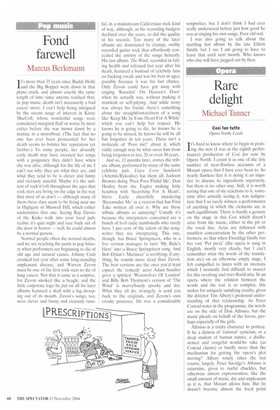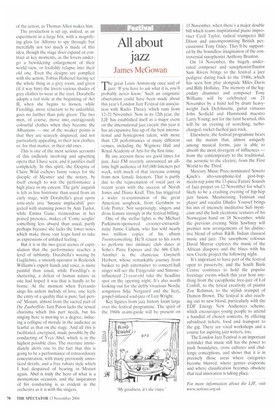Rare delight
Michael Tanner
Cosi fan tutte Opera North, Leeds
It's hard to know where to begin in praisling the new (I was at the eighth performance) production of Cosi fan tutte by Opera North. I count it as one of the tiny number of near-flawless accounts of a Mozart opera that I have ever been to. So nearly flawless that it is doing it an injustice to discuss its ingredients separately, but there is no other way. Still, it is worth noting that one of my reactions to it, sometime after actually seeing it, was indignation that I so rarely witness a performance of anything in which the elements are in such equilibrium. There is hardly a gesture on the stage in this Cosi which doesn't arise from the music, either in the pit or the vocal line. Arias are followed with manifest concentration by the other performers, so that when Fiordiligi finally has her vast 'Per pieta' (the opera is sung in English, mostly very clearly, but I can't remember what the words of the translation are) on an otherwise empty stage, I felt compelled to listen with an intensity which I normally find difficult to muster for this overlong and over-florid aria. In an opera where the relation between the words and the text is so complex, this makes for uniquely satisfying results, given the director Tim Albery's profound understanding of that relationship, As Peter Conrad notes in the programme, the words are on the side of Don Alfonso, but the music pleads on behalf of the lovers, perhaps especially of the girls.
Alfonso is a tricky character to portray. Is he a demon of 'rational' cynicism, or a deep student of human nature, a disillusioned and vengeful would-be rake (as Conrad claims) or hardly more than the mechanism for getting the opera's plot moving? Albery wisely takes the last course, largely. Peter Savidge's Alfonso is saturnine, given to rueful chuckles, but otherwise almost expressionless, like the small amount of music, dry and unpleasant as it is, that Mozart allows him. But he doesn't become almost the focal point
of the action, as Thomas Allen makes him.
The production is set up, indeed, as an experiment in a large box, with a magnifying glass for Alfonso to spy through; but mercifully not too much is made of this idea, though the stage does expand or contract at key moments, as the lovers undergo a bewildering enlargement of their world view, or foolishly relapse into their old one. Even the designs are complicit with the action, Tobias floheisel having set the whole thing in a grey room, and given (if it was him) the lovers various shades of grey clothes to wear at the start. Dorabella adopts a red stole at the beginning of Act II, when she begins to loosen, while Fiordiligi, more reluctant to be unfaithful, goes no further than pale green. The two men, of course, move into outrageously colourful clothes when they become the Albanians one of the weaker points is that they are scarcely disguised, and not particularly appealing, in their new clothes, or, for that matter, in their old ones.
This is one of the most serious accounts of this endlessly involving and upsetting opera that I have seen, and it justifies itself completely. In this spirit, the Despina of Claire Wild eschews funny voices for the disciple of Mesmer and the notary, by itself enough to win the performance a high place in my esteem. The girls' anguish is felt as less histrionic than usual from an early stage, with Dorabella's great opera seria-style aria `Smanie implacabili' projected with stunning power by Ann Taylor, while Emma Gane, tremendous in her poised presence, makes of 'Come scoglio' something less absurd than usual, partly perhaps because she lacks the lower notes which make those vast leaps hard to take as expressions of unfaked feeling.
But it is in the two great scenes of capitulation that the performance reaches a level of sublimity. Dorabella's wooing by Guglielmo, a smooth operator in Roderick Williams's expert hands and voice, is more painful than usual, while Fiordiligi's is shattering, a defeat of human nature as one had hoped it was that is hardly to be borne. At the moment when Ferrando sings his ardent melody of love, one feels the entry of a quality that is pure 'last period' Mozart, almost from the sacred part of Die Zauberflote. lain Paton lacks the sexual charisma which this part needs, but his singing here is moving to a degree, inducing a collapse of morale in the audience as fearful as that on the stage. And all this is facilitated, energised, made possible by the conducting of Yves Abel, which is in the highest possible class. The overture immediately alerts one to the fact that this is going to be a performance of extraordinary concentration, with many previously unnoticed details, and a free rubato style which I had despaired of hearing in Mozart again. Abel is truly the hero of what is a momentous occasion, and the inspiration of his conducting is as evident in the orchestra as it is with the singers.



























































































 Previous page
Previous page